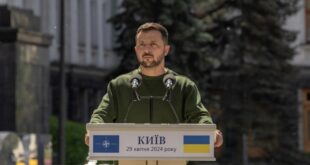Prominent critics have repeatedly died under murky circumstances during Putin's rule

Putin likely to 'tighten his grip' further on human rights, says analyst
7 hours ago
Russian opposition leader and critic Alexei Navalny has died in a Russian prison, one month ahead of the presidential election. Eurasia Group analyst Tinatin Japaridze joins Power & Politics to weigh in on how Russians are reacting to his death, and the consequences it may have for the country.
The reported death of Russian opposition leader Alexei Navalny marks yet another instance where the manner of a prominent Kremlin critic's passing has raised suspicion.
Prison authorities in Russia said Friday that Navalny had died at the age of 47 in a penal colony in the Article Circle. He had reportedly felt unwell after taking a walk, lost consciousness and then died.
His death saw Western leaders, including Prime Minister Justin Trudeau and U.S. President Joe Biden, cast blame on Russian President Vladimir Putin and his government for Navalny's demise.
During Putin's time in power, other outspoken critics of the Kremlin have died in a variety of murky circumstances, including via poison, violence and other avenues.
Navalny himself survived a suspected poisoning just a few years before his death. Putin denied the claims.
The 71-year-old Putin is seeking re-election in Russia's presidential election next month. He's widely expected to win, with no major opponents standing in his way.

Biden has ‘no doubt’ Putin is responsible in Navalny’s reported death
14 hours ago
U.S. President Joe Biden says 'we don't know exactly what happened' to Kremlin critic Alexei Navalny, who was reported dead by Russian officials. But Biden says there's 'no doubt' Navalny's death was a consequence of Russian officials — and Vladimir Putin.
Plane crash kills Prigozhin
Yevgeny Prigozhin, leader of the private military company Wagner Group, which was fighting in Ukraine, found himself at odds with Moscow after leading a short-lived mutiny last June.
He loudly complained about Moscow's decisions on the battlefields of Ukraine, which was invaded by Russia in February 2022, and eventually a group of his fighters crossed the Russian border in what appeared to be an attempted coup.

The act of rebellion lasted just hours, but the situation raised Putin's ire.
Reports emerged that Prigozhin would leave the country and go to Belarus.
Two months later, a plane crashed carrying the 62-year-old Prigozhin and nine other people. Everyone on board the flight died.
Fatal shooting of Nemtsov
Nine years ago, Boris Nemtsov was walking along a bridge near the Kremlin when he was hit by shots fired from a passing car.

The 55-year-old Russian opposition leader had previously served as the country's deputy prime minister in the late 1990s.
A Russian court later convicted five men in the killing of Nemtsov, though his allies said the probe into his death had been a coverup.
Politkovskaya slain in elevator
Anna Politkovskaya, a journalist for the newspaper Novaya Gazeta, was shot and killed in the elevator of her Moscow apartment building on Oct. 7, 2006 — Putin's 54th birthday.

The 48-year-old Politkovskaya was known for her critical coverage of Putin and his government's campaign in Chechnya. She'd won international acclaim for her reporting.
Five people were later convicted in connection with her killing.
Litvinenko poisoned
A cup of tea laced with a radioactive isotope led to the death of Alexander Litvinenko nearly two decades ago.

The former KGB officer turned Kremlin critic fell ill after drinking the tea on Nov. 1, 2006. Twenty-two days later, he died in a London hospital at age 43.
Moscow denied involvement in his death, but the European Court of Human Rights ruled in 2021 that Russia was responsible for his killing.
A separate British inquiry had previously concluded that Putin had probably approved a plan to have Litvinenko killed.
At that time he was poisoned, Litvinenko had been investigating the shooting death of Politkovskaya as well as the Russian intelligence service's alleged links to organized crime.
*****
Credit belongs to : www.cbc.ca
 MaharlikaNews | Canada Leading Online Filipino Newspaper Portal The No. 1 most engaged information website for Filipino – Canadian in Canada. MaharlikaNews.com received almost a quarter a million visitors in 2020.
MaharlikaNews | Canada Leading Online Filipino Newspaper Portal The No. 1 most engaged information website for Filipino – Canadian in Canada. MaharlikaNews.com received almost a quarter a million visitors in 2020.







